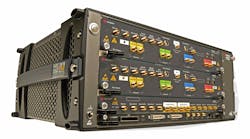Keysight offers M8199A 256-GSa/s arbitrary waveform generator
Keysight Technologies, Inc. (NYSE: KEYS) says it now offers the M8199A, which the company asserts is the first 256-GSa/s arbitrary waveform generator (AWG) on the market. The instrument supplies 65-GHz analog bandwidth in a two-slot AXIe module. Keysight says the M8199A will prove useful in testing the discrete components of an optical coherent transmission system or researching technology for terabit transmission in data centers.
The company says the 256-GSa/s rate is twice that available and the 65-GHz analog bandwidth at least 50% greater than other instruments can provide. The performance derives from a new digital-to-analog converter ASIC that translates the memory data into an analog signal. Keysight says it also created a new package that avoids soldering sensitive RF signals by placing an RF connector at the DAC-ASIC to avoid signal degradation. The M8199A also benefits from a new amplifier technology that Keysight says enables high-speed, high-quality output signals with a smooth frequency roll-off. The company adds that the AWG can deliver a usable signal bandwidth beyond the nominal 65 GHz, to up to 80 GHz.
Keysight sees the AWG proving popular to those conducting early research in new technologies, particularly as they load waveforms, test pre-distortion algorithms, create stimuli for experiments, and generate radar pulses of high modulation bandwidth.
“Keysight continues to invest in core test and measurement technologies, and we are happy to introduce the world’s first 256-GSa/s AWG,” said Brad Doerr, vice president and general manager of Keysight’s Digital and Photonics Center of Excellence. “We are confident that the new M8199A will enable our customers to take the next step in the race for higher data transmission rates.”
Pricing for the M8199A AWG starts at $331,000 for the two-channel 128-GSa/s version. Keysight says the AWG will be available this December.
For related articles, visit the Test and Measurement Topic Center.
For more information on test instruments and suppliers, visit the Lightwave Buyer’s Guide.
To stay abreast of optical communications technology, subscribe to the Enabling Technologies Topic Center.

Stephen Hardy | Editorial Director and Associate Publisher, Lightwave
Stephen Hardy is editorial director and associate publisher of Lightwave and Broadband Technology Report, part of the Lighting & Technology Group at Endeavor Business Media. Stephen is responsible for establishing and executing editorial strategy across the both brands’ websites, email newsletters, events, and other information products. He has covered the fiber-optics space for more than 20 years, and communications and technology for more than 35 years. During his tenure, Lightwave has received awards from Folio: and the American Society of Business Press Editors (ASBPE) for editorial excellence. Prior to joining Lightwave in 1997, Stephen worked for Telecommunications magazine and the Journal of Electronic Defense.
Stephen has moderated panels at numerous events, including the Optica Executive Forum, ECOC, and SCTE Cable-Tec Expo. He also is program director for the Lightwave Innovation Reviews and the Diamond Technology Reviews.
He has written numerous articles in all aspects of optical communications and fiber-optic networks, including fiber to the home (FTTH), PON, optical components, DWDM, fiber cables, packet optical transport, optical transceivers, lasers, fiber optic testing, and more.
You can connect with Stephen on LinkedIn as well as Twitter.
